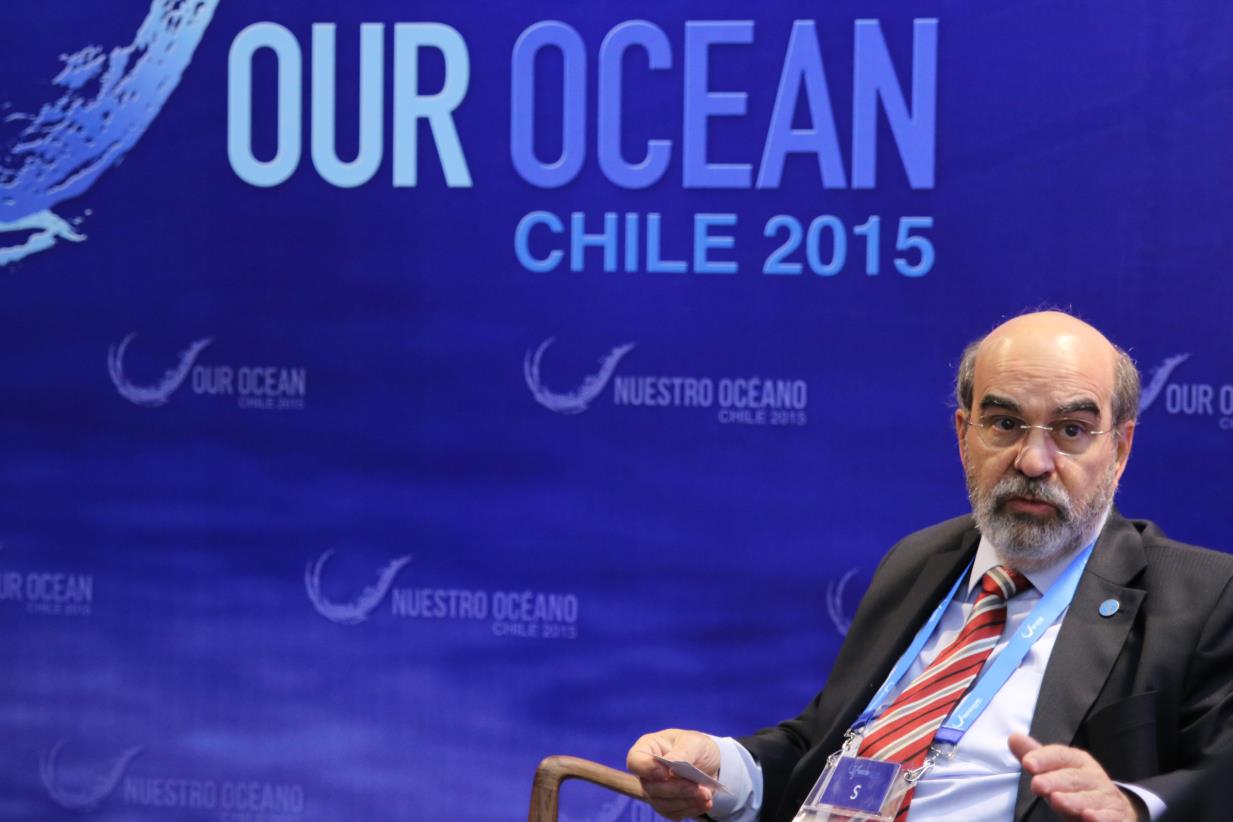Healthy oceans are key to achieving the SDGs including zero hunger
FAO Director-General participates in the 2015 Our Ocean conference in Chile

FAO Director-General José Graziano da Silva
©Photo: ©FAO/Max Valencia
6 October 2015, Santiago, Chile - The huge potential of the oceans, seas and coastal areas for sustainable development and hunger eradication will only be realized if they are kept healthy and productive, said FAO Director-General, Jose Graziano da Silva, during the high-level international Our Ocean conference, held in Valparaiso, Chile.
The 5-6 October event, which saw the participation of over 400 people representing governments, civil society and academia, mainly focused on the search for solutions to address marine pollution, acidification of the seas and other problems related to climate change.
"The health of our own planet and our food security depends on how we treat the blue world," Graziano da Silva said during the meeting, which was attended by John Kerry, Secretary of State of the United States, among other senior officials.
According to FAO, over 40 percent of the world's population lives within 100 kilometers of the coast. And the livelihoods of 12 percent of the world's population depend on fisheries and aquaculture.
Sustainable use of water resources is a global priority
"We cannot continue to use water resources as if they were infinite," said Graziano da Silva, noting that nearly a third of the world's fish stocks are overfished.
The 2030 Sustainable Development Agenda adopted by the international community during the last General Assembly of the United Nations refers specifically to the conservation and sustainable use of the oceans, seas and marine resources in the 14th Sustainable Development Objective.
"FAO is committed to making every effort to achieve compliance with the 17 Sustainable Development Goals, since we have much to contribute in the vast majority of them," said Graziano da Silva.
The risks of climate change
Global warming is modifying the distribution and productivity of fisheries, affecting the biological processes of marine species and altering its complex food webs, while fisherfolk, those who depend on aquaculture for their livelihoods and coastal inhabitants are suffering due to the increased intensity and frequency of extreme weather events.
According to FAO, the carbon emissions that cause climate change contribute to the acidification of the oceans, which in turn threaten the development and survival of many species and marine organisms.
"Ocean habitats, including mangroves, salt marshes, seagrass and algae can absorb up to five times more carbon than tropical forests," said Graziano da Silva.
Rescuing our oceans
In some regions of the world, the introduction of fisheries management plans has restored fish stocks. FAO and the World Bank estimate that the potential economic benefits of restoring fish stocks and reducing fishing capacity to an optimal level amounts to some$50 billion per year.
"The implementation of national, regional and global strategies for a Blue Economy and Blue Azul will help reduce the pressure on our oceans and restore the functions and structure of aquatic ecosystems for sustainable use of our wetlands and oceans," Graziano da Silva said.
FAO is working with the international community to ratify and implement global initiatives such as the Code of Conduct for Responsible Fisheries, Voluntary guidelines for securing sustainable small-scale fisheries in the context of food security and poverty Eradication (SSF Guidelines), Port State Measures Agreement, and the Flag State Performance Guidelines.
An important part of the bilateral meetings held by the FAO Director-General was devoted to emphasize the importance of implementing measures that discourage the practice of illegal, unreported and unregulated fishing.
"It is essential to promote the ratification of the Port State Measures Agreement and the Flag State Performance Guidelines", said Graziano da Silva, noting that the Our Ocean event is a unique opportunity to encourage other countries to follow this process. The Port State Agreement has been ratified by 13 countries worldwide and requires a minimum of 25 countries to come into force.
Chile and Uruguay are the countries of Latin America and the Caribbean that have so far ratified both of these agreements and are able to work with other countries to strengthen their internal monitoring and control mechanisms that allow them to prepare for the ratification and implementation of those agreements.
As part of the Our Ocean encounter, the Director General of FAO had the opportunity to have bilateral meetings with the Prince of Monaco, Albert II, Cathy Novelli, Undersecretary for Economic Growth, Energy and the Environment of the United States, with Osea Naiqamu, Minister of Fisheries and Forests of Fiji, the Minister of Fisheries and Agriculture of Iceland, Sigurður Ingi Jóhannsson, with the Commissioner for the Environment and Fisheries and Maritime Affairs of the European Union, Karmenu Vella, and with David Rockefeller Jr., from the conservation organization "Sailors for the Sea ", among others.
Contact
Benjamín Labatut FAO Regional Office for Latin America and the Carribean (+39) 06 570 53625 [email protected]
